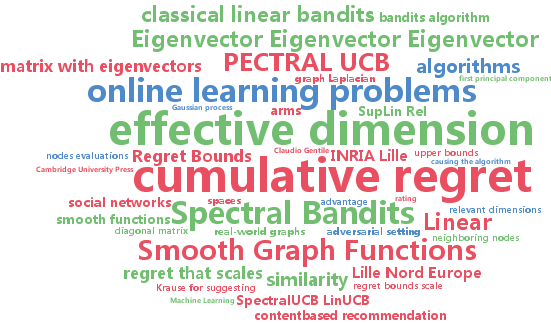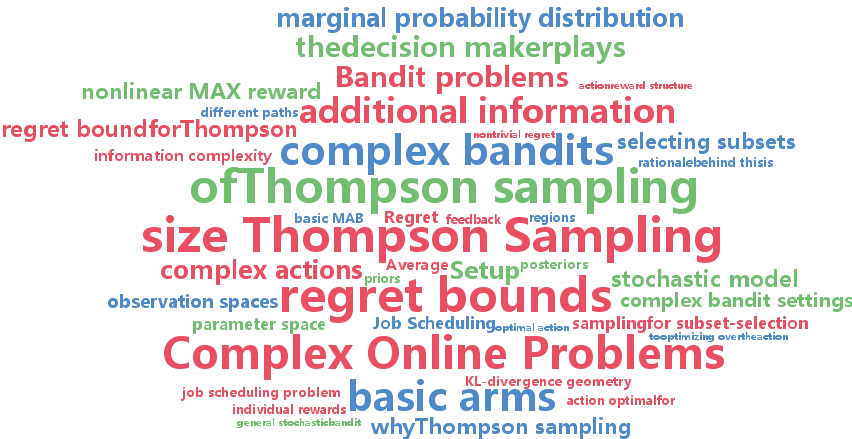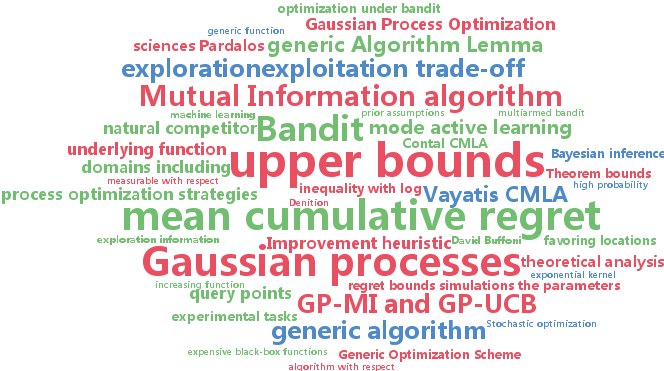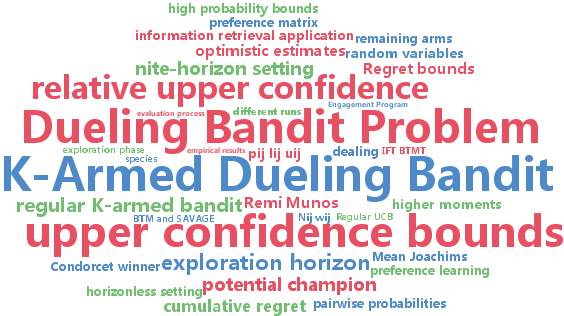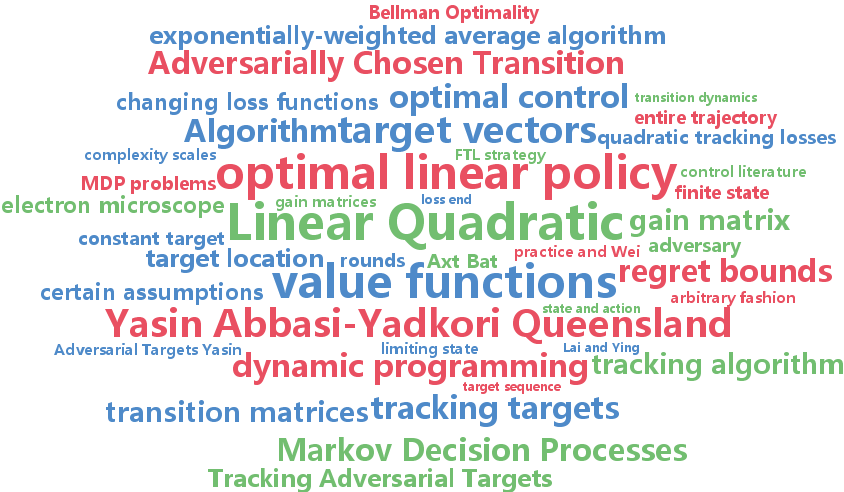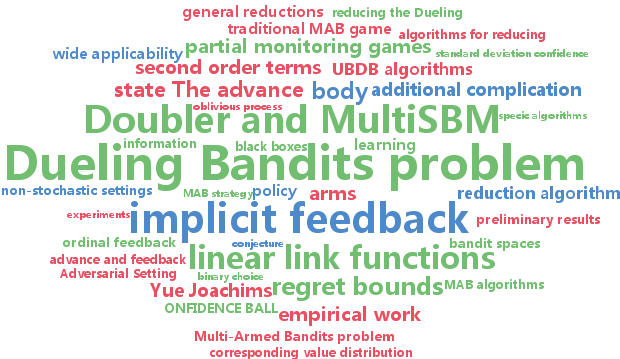regret bounds
-
Michal Valko and Remi Munos and Branislav Kveton and Tomáš Kocák
Spectral Bandits for Smooth Graph Functions (pdf)
Smooth functions on graphs have wide applications in manifold and semi-supervised learning. In this paper, we study a bandit problem where the payoffs of arms are smooth on a graph. This framework is suitable for solving online learning problems that involve graphs, such as content-based recommendation. In this problem, each item we can recommend is a node and its expected rating is similar to its neighbors. The goal is to recommend items that have high expected ratings. We aim for the algorithms where the cumulative regret with respect to the optimal policy would not scale poorly with the number of nodes. In particular, we introduce the notion of an effective dimension, which is small in real-world graphs, and propose two algorithms for solving our problem that scale linearly and sublinearly in this dimension. Our experiments on real-world content recommendation problem show that a good estimator of user preferences for thousands of items can be learned from just tens of nodes evaluations.
-
Aditya Gopalan and Shie Mannor and Yishay Mansour
Thompson Sampling for Complex Online Problems (pdf)
We consider stochastic multi-armed bandit problems with complex actions over a set of basic arms, where the decision maker plays a complex action rather than a basic arm in each round. The reward of the complex action is some function of the basic arms' rewards, and the feedback observed may not necessarily be the reward per-arm. For instance, when the complex actions are subsets of the arms, we may only observe the maximum reward over the chosen subset. Thus, feedback across complex actions may be coupled due to the nature of the reward function. We prove a frequentist regret bound for Thompson sampling in a very general setting involving parameter, action and observation spaces and a likelihood function over them. The bound holds for discretely-supported priors over the parameter space and without additional structural properties such as closed-form posteriors, conjugate prior structure or independence across arms. The regret bound scales logarithmically with time but, more importantly, with an improved constant that non-trivially captures the coupling across complex actions due to the structure of the rewards. As applications, we derive improved regret bounds for classes of complex bandit problems involving selecting subsets of arms, including the first nontrivial regret bounds for nonlinear MAX reward feedback from subsets. Using particle filters for computing posterior distributions which lack an explicit closed-form, we present numerical results for the performance of Thompson sampling for subset-selection and job scheduling problems.
-
Emile Contal and Vianney Perchet and Nicolas Vayatis
Gaussian Process Optimization with Mutual Information (pdf)
In this paper, we analyze a generic algorithm scheme for sequential global optimization using Gaussian processes. The upper bounds we derive on the cumulative regret for this generic algorithm improve by an exponential factor the previously known bounds for algorithms like GP-UCB. We also introduce the novel Gaussian Process Mutual Information algorithm (GP-MI), which significantly improves further these upper bounds for the cumulative regret. We confirm the efficiency of this algorithm on synthetic and real tasks against the natural competitor, GP-UCB, and also the Expected Improvement heuristic.
-
Masrour Zoghi and Shimon Whiteson and Remi Munos and Maarten de Rijke
Relative Upper Confidence Bound for the K-Armed Dueling Bandit Problem (pdf)
This paper proposes a new method for the K-armed dueling bandit problem, a variation on the regular K-armed bandit problem that offers only relative feedback about pairs of arms. Our approach extends the Upper Confidence Bound algorithm to the relative setting by using estimates of the pairwise probabilities to select a promising arm and applying Upper Confidence Bound with the winner as a benchmark. We prove a sharp finite-time regret bound of order O(K log t) on a very general class of dueling bandit problems that matches a lower bound proven in (Yue et al., 2012). In addition, our empirical results using real data from an information retrieval application show that it greatly outperforms the state of the art.
-
Yasin Abbasi-Yadkori and Peter Bartlett and Varun Kanade
Tracking Adversarial Targets (pdf)
We study linear control problems with quadratic losses and adversarially chosen tracking targets. We present an efficient algorithm for this problem and show that, under standard conditions on the linear system, its regret with respect to an optimal linear policy grows as $O(\log^2 T)$, where $T$ is the number of rounds of the game. We also study a problem with adversarially chosen transition dynamics; we present an exponentially-weighted average algorithm for this problem, and we give regret bounds that grow as $O(\sqrt T)$.
-
Nir Ailon and Zohar Karnin and Thorsten Joachims
Reducing Dueling Bandits to Cardinal Bandits (pdf)
We present algorithms for reducing the Dueling Bandits problem to the conventional (stochastic) Multi-Armed Bandits problem. The Dueling Bandits problem is an online model of learning with ordinal feedback of the form ``A is preferred to B'' (as opposed to cardinal feedback like ``A has value 2.5''), giving it wide applicability in learning from implicit user feedback and revealed and stated preferences. In contrast to existing algorithms for the Dueling Bandits problem, our reductions -- named $\Doubler$, $\MultiSbm$ and $\DoubleSbm$ -- provide a generic schema for translating the extensive body of known results about conventional Multi-Armed Bandit algorithms to the Dueling Bandits setting. For $\Doubler$ and $\MultiSbm$ we prove regret upper bounds in both finite and infinite settings, and conjecture about the performance of $\DoubleSbm$ which empirically outperforms the other two as well as previous algorithms in our experiments. In addition, we provide the first almost optimal regret bound in terms of second order terms, such as the differences between the values of the arms.
